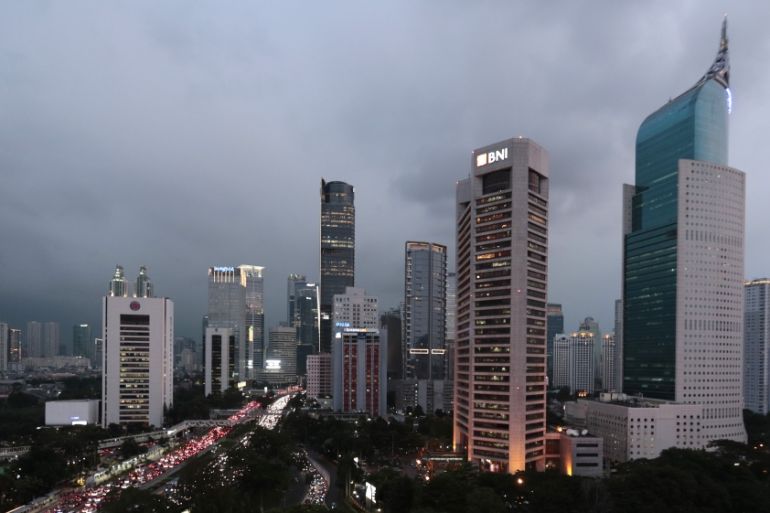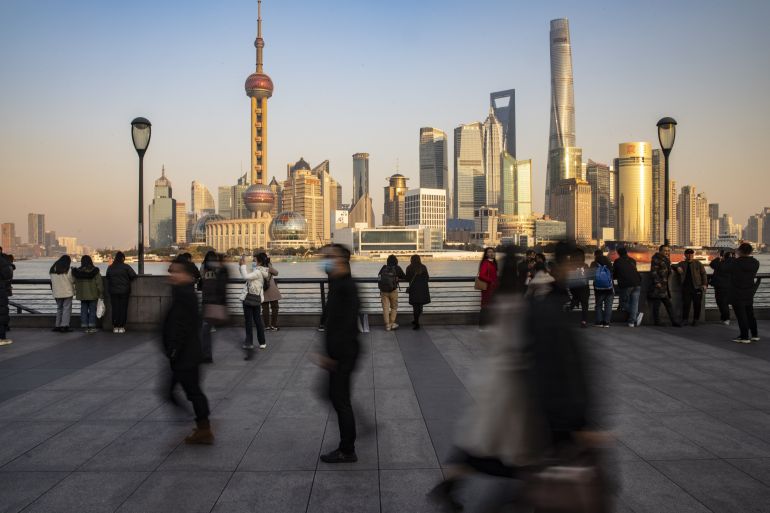Ukraine-Russia crisis: Asian economies brace for inflation hit
Conflict in Ukraine and sanctions against Russia are expected to drive energy prices higher across Asia.

Hong Kong, China – Russia’s invasion of Ukraine is plunging Europe into its worst crisis since World War II, and the economic ramifications are percolating through to Asia.
While Asian equity markets bounced back on Friday, taking cues from a rebound on Wall Street, analysts warn that surging commodity prices, supply chain disruptions and an inflationary crunch are likely to strain consumers in the region and affect daily lives.
Keep reading
list of 4 itemsPhotos: Hundreds arrested as Russians protest invasion of Ukraine
Ukraine-Russia crisis: Will China be Putin’s economic lifeline?
Nigerian students stranded in Ukraine amid Russian invasion
War in Ukraine and sanctions against Russia, the world’s second-largest natural gas exporter and third-largest producer of petroleum, are expected to drive energy prices in Asia even higher.
Trinh Nguyen, a senior economist for Asia at Natixis in Hong Kong, told Al Jazeera that the overall picture looked negative but not catastrophic.
“Higher oil is a net negative for Asia because we’re net importers of oil,” Nguyen said. “That will mean inflationary pressure and higher costs. That’s going to dampen consumer purchasing power.”
Nguyen pointed to India, the world’s third-largest oil importer, as one of the Asian countries most susceptible to an economic shock.
“This is clearly negative for India, it’s going to have to pay more for oil,” she said. “The question we have to ask is, who’s going to pay for it? Will the government subsidise it? And if it does, then everyone pays for it as a nation.”
Nguyen said that prices would rise for the average person in India, as the Indian rupee had already shown signs of slipping against the US dollar on Thursday.
Southeast Asia
Southeast Asian economies are also bracing for the effect of higher prices of crude oil and natural gas. Several countries in the region, including Singapore and Indonesia, have condemned the Kremlin’s actions in Ukraine but stopped short of issuing sanctions of their own.
Andreas Harsono, a researcher at Human Rights Watch in Jakarta, expressed concern about the rippling effect of energy prices on everyday goods.
“If the Ukraine invasion and sanctions against Russia get out of control, they could push up pressure on the Indonesian rupiah, disrupting trade and supplies in the market,” Harsono told Al Jazeera. “If the disruption makes basic food goods, especially rice, cooking oil, sugar and milk disappear from the shelves, then we could expect chaos.”
Nguyen said the effect of the crisis in Indonesia would be a “mixed bag”. On one hand, Indonesians will be paying more for energy, but it may benefit the country as a considerable exporter of commodities.
“It depends on who you are in Indonesia,” said Nguyen, “If you’re an exporter of commodities you’re gaining more. But consumers who will face higher prices are very important in what is a very domestic demand-driven economy.”

In China, Ether Yin of Trivium China said the country could “soon feel upstream inflation pressure”.
“Chinese policymakers have already been stuck in an uphill battle to control the price of key commodities to ease industrial inflation,” Yin told Al Jazeera. “Both Russia and Ukraine are key suppliers of some key commodities to China. The crisis just made that job much harder.”
Beijing has rejected characterisations of the Kremlin’s actions as an “invasion” and accused the United States of “fuelling the flame” of the crisis.
BBVA economist Xia Le said the world’s second-largest economy is unlikely to take a significant economic hit.
“In the short and long term, the impact is likely to be minor because China is a very big export country,” Xia told Al Jazeera. “They are importing energy products from Russia and some agricultural products from Ukraine, but overall it shouldn’t be a big issue for China. It shouldn’t be difficult for China to find alternative sources of energy, even if an escalation of the conflict leads to supply disruptions.”
According to Xia Le, the crisis’s effects will be mitigated because China and Russia have strong ties, and Beijing is highly unlikely to join the US and its allies in issuing punitive economic sanctions on Moscow.
In fact, Beijing could help soften the blow. China’s General Administration of Customs confirmed on Thursday that it would lift all wheat import restrictions on Moscow. The deal was part of a number of agreements struck during Russian President Vladimir Putin’s trip to Beijing early this month.
In announcing new sanctions against Moscow, US President Joe Biden said Washington would “limit Russia’s ability to do business in dollars, euros, pounds and Japanese yen”.
Xia Le said Beijing and Moscow would likely find a workaround.
“I think they will use renminbi as a transaction of settlement currency,” Xia said. “Russia may become reliant on China but China will have to be a little cautious in dealing with Russia from a trade perspective.”
Japan and South Korea
Elsewhere in Northeast Asia, Japan and South Korea are anticipating higher inflation, but a limited economic effect in the short term.
Japanese Prime Minister Fumio Kishida on Friday announced Tokyo would strengthen sanctions on Russia in response to the deployment of Russian troops in Ukraine. South Korea has said it will cooperate with the international community on sanctions against Moscow, but has declined to draw up punitive measures of its own.
Capital Economics’ Tom Learmouth told Al Jazeera he did not expect the crisis to have major ramifications on the Japanese economy overall because only 2 percent of Japan’s imports come from Russia.
But he said a spike in energy prices caused by significant disruption to Russian exports “would lift Japanese inflation to 2 percent from April until the end of this year.”
However, Learmouth does not expect the Bank of Japan to respond by lifting policy rates.
“It wouldn’t be able to argue that inflation was overshooting its 2 percent target in a sustained manner,” he told Al Jazeera.